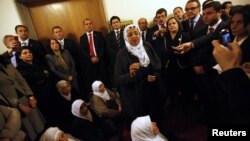ISTANBUL, TURKEY —
This Friday marks the first anniversary of the killing of 34 Kurdish smugglers by a mistaken Turkish air strike. The incident remains contentious in Turkey, with pressure both nationally and internationally on the government to punish those responsible.
The 34 Turkish Kurds who were killed were smuggling contraband from neighboring Iraq. They were hit by an air strike from the Turkish military after being mistaken for members of the Kurdish rebel group, the PKK.
The victims came from the village of Uludere, or Roboski in Kurdish. With around half of those killed being teenagers, it caused a national outcry. One year later, family members of those who died are still coming to terms with their loss.
Demanding action
One woman said her family's life has completely changed. She recalled that her son was cheerful, and she said that when she see his friends come back from the school, she watches them from a window and can't help but cry.
The government, after initially defending the military action, offered compensation to the families and promised a full investigation. Criticism is growing both domestically and internationally, however, over the pace of the probes.
Emma Sinclair Webb is a senior researcher for the U.S.-based Human Rights Watch [HRW].
"The criminal investigation that is being undertaken, there seems to be no progress in that. We also do not know when the parliamentary sub commission that has been tasked into looking into this incident will conclude its own investigation," said Webb. "And it looks like there is huge reluctance at the top to see a open investigation into full circumstances that led to 34 villagers being killed."
The government says that in the past, inquiries would not have happened with the Turkish military being above such scrutiny.
But Turkey's opposition parties have become increasingly critical about the pace of the inquiries and are voicing growing doubts that that those responsible will ever be held to account.
Growing concern
Kurdish Peace and Democracy Party member Ertugrul Kurkcu is a part of the parliamentary investigation committee looking into the killings.
"A primary roadblock in this investigation is the chief of staff because they do not deliver the information in their hands, but also this government because the government does not press the chief of staff," said Kurkcu.
Political scientist Cengiz Aktar of Istanbul’s Bahcesehir University said the failure by Turkey's ruling party to fully investigate the killings and hold those responsible sends worrying messages.
"It's a very important issue, in terms of running the country, in terms of transparency, in terms of control of the military and it tells us the value of the second class citizens that the Kurds are in this country," said Aktar.
According to Turkish media reports, the parliamentary inquiry into the killings could publish its findings early next year.
Observers say with the Turkish military appearing not to be fully cooperating, though, and under no pressure to do so, expectations remain low in Turkey that the truth of what happened will come to light.
The 34 Turkish Kurds who were killed were smuggling contraband from neighboring Iraq. They were hit by an air strike from the Turkish military after being mistaken for members of the Kurdish rebel group, the PKK.
The victims came from the village of Uludere, or Roboski in Kurdish. With around half of those killed being teenagers, it caused a national outcry. One year later, family members of those who died are still coming to terms with their loss.
Demanding action
One woman said her family's life has completely changed. She recalled that her son was cheerful, and she said that when she see his friends come back from the school, she watches them from a window and can't help but cry.
The government, after initially defending the military action, offered compensation to the families and promised a full investigation. Criticism is growing both domestically and internationally, however, over the pace of the probes.
Emma Sinclair Webb is a senior researcher for the U.S.-based Human Rights Watch [HRW].
"The criminal investigation that is being undertaken, there seems to be no progress in that. We also do not know when the parliamentary sub commission that has been tasked into looking into this incident will conclude its own investigation," said Webb. "And it looks like there is huge reluctance at the top to see a open investigation into full circumstances that led to 34 villagers being killed."
The government says that in the past, inquiries would not have happened with the Turkish military being above such scrutiny.
But Turkey's opposition parties have become increasingly critical about the pace of the inquiries and are voicing growing doubts that that those responsible will ever be held to account.
Growing concern
Kurdish Peace and Democracy Party member Ertugrul Kurkcu is a part of the parliamentary investigation committee looking into the killings.
"A primary roadblock in this investigation is the chief of staff because they do not deliver the information in their hands, but also this government because the government does not press the chief of staff," said Kurkcu.
Political scientist Cengiz Aktar of Istanbul’s Bahcesehir University said the failure by Turkey's ruling party to fully investigate the killings and hold those responsible sends worrying messages.
"It's a very important issue, in terms of running the country, in terms of transparency, in terms of control of the military and it tells us the value of the second class citizens that the Kurds are in this country," said Aktar.
According to Turkish media reports, the parliamentary inquiry into the killings could publish its findings early next year.
Observers say with the Turkish military appearing not to be fully cooperating, though, and under no pressure to do so, expectations remain low in Turkey that the truth of what happened will come to light.




